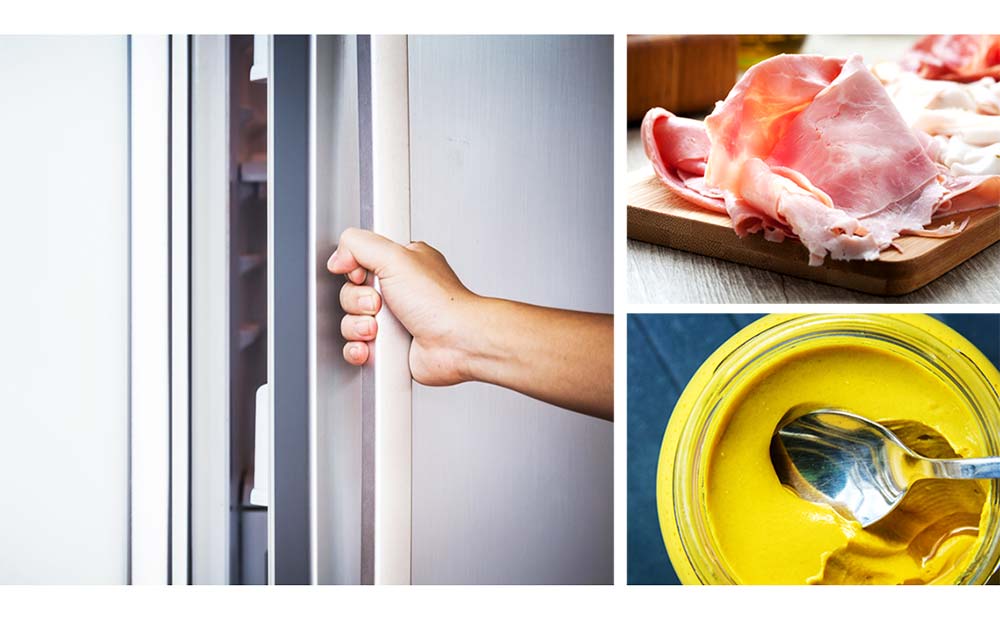Many items in the fridge can go well beyond their use-by date without smelling funky or looking weird, but they could easily be expired—and you don’t want to find out the hard way. Check the dates on these fridge stapes before you take a bite.
Deli meat

While the plastic packaging might appear to keep your sandwich fixings fresh, as soon as the slices are separated at the deli counter, their freshness begins to wane. Most sliced meat producers, including Boar’s Head Brand, recommend that their products be consumed within three to five days of purchase, though it should be safe to eat them within 7 to 10 days of the sell-by date. Signs it’s gone bad: If it feels extremely slimy, if it smells remotely of vinegar, ammonia, or yeast, or if there’s any mold or other growth on the meat or the package.
Hot dogs

Heavily processed meats often have a longer shelf-life, but it’s not forever. In an unopened package, hot dogs stay good for about two weeks in the refrigerator, according to the FDA. Once you open the plastic, the window drops to one week. A cooked hot dog can last an additional week, so get creative with recipes if time is running out. Don’t miss these 13 more foods you should never, ever eat past the expiration date.
Garlic

Garlic has many health benefits, so for best results, store whole garlic bulbs at room temperature in a dark, dry place. If you’ve prepared too much or broken the bulb, the USDA recommends using the vegetable as soon as possible. Minced garlic starts to turn in a few hours, and whole cloves will last around one week. If the clove has started to sprout, discard it immediately.
Egg substitute/liquid eggs

Though convenient, once opened cartons of egg whites and egg substitutes tend to go bad fairly quickly. Foodsafety.gov recommends consuming opened egg products within two to three days. Unopened, these products can last for months, but as soon as the seal is broken, the printed expiration date becomes null and void, so cook them up ASAP.
Bacon

While cooked bacon seems like it should last for a long time if properly stored in the fridge, foodsafety.gov recommends consuming it within the week. For fresh, raw sausage, cook it up within one to two days of purchase; it will keep a few extra days, cooked.
Mayonnaise

The use-by dates on mayonnaise jars are often a long way into the future, but as soon as it’s opened the product starts to deteriorate even if it’s correctly stored. The USDA recommends that once opened, mayonnaise should be used within two months. If your mayonnaise ends up sitting out on the counter for more than two hours at room temperature, toss it regardless of how long it has been open. Homemade mayonnaise should be consumed within five days.
Leftovers

Even when stored properly in air-tight containers, leftover cooked food should be eaten within two to three days of storing it, according to the Mayo Clinic’s food safety guidelines. But, make sure the leftovers don’t cool on the counter before you store them. Food bacteria multiplies most quickly between 40 and 140 degrees F. On the other hand, these are the 11 foods you’re throwing out way too soon.
Leftover wine

Once you open a bottle, oxygen starts breaking down the compounds in wine. Even with air-tight storage in the fridge, a bottle of white or red wine will lose most of its flavor in one to two days and is unsafe to drink in six to seven days, according to foodsafety.gov.
Tomato-based sauce

Like other sauces, as soon as the pressurized cans or jars are opened and the contents are exposed to the air, tomato-based sauces begin to deteriorate. Regardless of the use-by date printed on the lid, which refers to the unopened product, consume open tomato sauce within five days, per FDA advice.
Condiments

Because most condiments have a nearly indefinite shelf life when unopened, the printed dates go entirely out the window once opened and refrigerated. While every condiment has a different threshold, a visual check for changes in consistency and color as well as a sniff test should keep you and your family safe.












